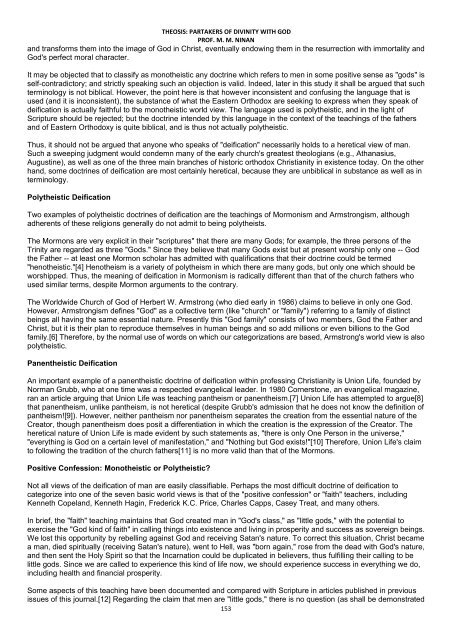Theosis
You also want an ePaper? Increase the reach of your titles
YUMPU automatically turns print PDFs into web optimized ePapers that Google loves.
THEOSIS: PARTAKERS OF DIVINITY WITH GOD<br />
PROF. M. M. NINAN<br />
and transforms them into the image of God in Christ, eventually endowing them in the resurrection with immortality and<br />
God's perfect moral character.<br />
It may be objected that to classify as monotheistic any doctrine which refers to men in some positive sense as "gods" is<br />
self-contradictory; and strictly speaking such an objection is valid. Indeed, later in this study it shall be argued that such<br />
terminology is not biblical. However, the point here is that however inconsistent and confusing the language that is<br />
used (and it is inconsistent), the substance of what the Eastern Orthodox are seeking to express when they speak of<br />
deification is actually faithful to the monotheistic world view. The language used is polytheistic, and in the light of<br />
Scripture should be rejected; but the doctrine intended by this language in the context of the teachings of the fathers<br />
and of Eastern Orthodoxy is quite biblical, and is thus not actually polytheistic.<br />
Thus, it should not be argued that anyone who speaks of "deification" necessarily holds to a heretical view of man.<br />
Such a sweeping judgment would condemn many of the early church's greatest theologians (e.g., Athanasius,<br />
Augustine), as well as one of the three main branches of historic orthodox Christianity in existence today. On the other<br />
hand, some doctrines of deification are most certainly heretical, because they are unbiblical in substance as well as in<br />
terminology.<br />
Polytheistic Deification<br />
Two examples of polytheistic doctrines of deification are the teachings of Mormonism and Armstrongism, although<br />
adherents of these religions generally do not admit to being polytheists.<br />
The Mormons are very explicit in their "scriptures" that there are many Gods; for example, the three persons of the<br />
Trinity are regarded as three "Gods." Since they believe that many Gods exist but at present worship only one -- God<br />
the Father -- at least one Mormon scholar has admitted with qualifications that their doctrine could be termed<br />
"henotheistic."[4] Henotheism is a variety of polytheism in which there are many gods, but only one which should be<br />
worshipped. Thus, the meaning of deification in Mormonism is radically different than that of the church fathers who<br />
used similar terms, despite Mormon arguments to the contrary.<br />
The Worldwide Church of God of Herbert W. Armstrong (who died early in 1986) claims to believe in only one God.<br />
However, Armstrongism defines "God" as a collective term (like "church" or "family") referring to a family of distinct<br />
beings all having the same essential nature. Presently this "God family" consists of two members, God the Father and<br />
Christ, but it is their plan to reproduce themselves in human beings and so add millions or even billions to the God<br />
family.[6] Therefore, by the normal use of words on which our categorizations are based, Armstrong's world view is also<br />
polytheistic.<br />
Panentheistic Deification<br />
An important example of a panentheistic doctrine of deification within professing Christianity is Union Life, founded by<br />
Norman Grubb, who at one time was a respected evangelical leader. In 1980 Cornerstone, an evangelical magazine,<br />
ran an article arguing that Union Life was teaching pantheism or panentheism.[7] Union Life has attempted to argue[8]<br />
that panentheism, unlike pantheism, is not heretical (despite Grubb's admission that he does not know the definition of<br />
pantheism![9]). However, neither pantheism nor panentheism separates the creation from the essential nature of the<br />
Creator, though panentheism does posit a differentiation in which the creation is the expression of the Creator. The<br />
heretical nature of Union Life is made evident by such statements as, "there is only One Person in the universe,"<br />
"everything is God on a certain level of manifestation," and "Nothing but God exists!"[10] Therefore, Union Life's claim<br />
to following the tradition of the church fathers[11] is no more valid than that of the Mormons.<br />
Positive Confession: Monotheistic or Polytheistic?<br />
Not all views of the deification of man are easily classifiable. Perhaps the most difficult doctrine of deification to<br />
categorize into one of the seven basic world views is that of the "positive confession" or "faith" teachers, including<br />
Kenneth Copeland, Kenneth Hagin, Frederick K.C. Price, Charles Capps, Casey Treat, and many others.<br />
In brief, the "faith" teaching maintains that God created man in "God's class," as "little gods," with the potential to<br />
exercise the "God kind of faith" in calling things into existence and living in prosperity and success as sovereign beings.<br />
We lost this opportunity by rebelling against God and receiving Satan's nature. To correct this situation, Christ became<br />
a man, died spiritually (receiving Satan's nature), went to Hell, was "born again," rose from the dead with God's nature,<br />
and then sent the Holy Spirit so that the Incarnation could be duplicated in believers, thus fulfilling their calling to be<br />
little gods. Since we are called to experience this kind of life now, we should experience success in everything we do,<br />
including health and financial prosperity.<br />
Some aspects of this teaching have been documented and compared with Scripture in articles published in previous<br />
issues of this journal.[12] Regarding the claim that men are "little gods," there is no question (as shall be demonstrated<br />
153

















